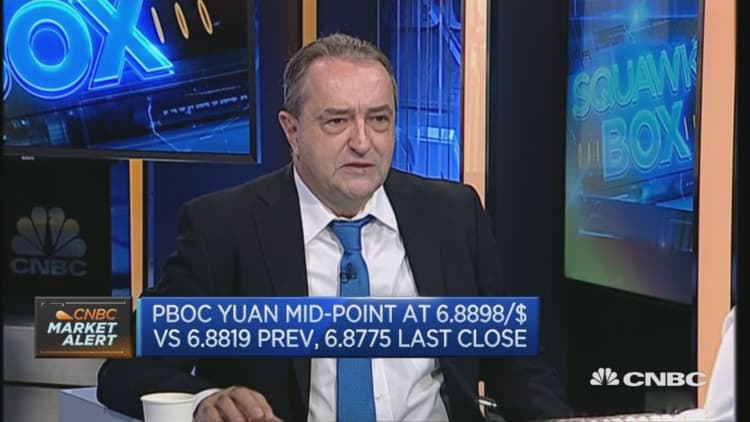Asian markets moved into positive territory on Monday, taking a cue from the U.S. last week after markets climbed to new high on improved risk appetite as investors shook off geopolitical concerns over North Korea's weekend ballistic missile test.
Economic data in the region has also been relatively buoyant, with Japan's economy expanding for the fourth straight quarter at an annualized rate of 1.0 percent in October to December period, supported by solid exports and capital expenditure.
Also last Friday, China's trade figures for January had topped forecasts, with exports up 7.9 percent from a year earlier and imports up 16.7 percent.
The closed up 0.41 percent or 80.2 points at 19,459.15 after Japanese Prime Minister Shinzo Abe's weekend visit to the U.S. and first meeting with President Trump.
Over the weekend, Trump set aside harsh rhetoric about Japan stealing American jobs and taking advantage of U.S. defense aid over the weekend, and reaffirmed that "U.S. commitment to defend Japan through the full range of U.S. military capabilities, both nuclear and conventional, is unwavering," in a joint statement.
South Korea's Kospi wavered for most of the session, but ended up 0.17 percent or 3.57 points at 2,078.65. The index's gains were capped as the market grappled with news of North Korea's latest missile test.
North Korea fired a ballistic missile into the sea on Sunday morning, and on Monday morning, Pyongyang said that the test of a new missile type at the weekend was successful and is capable of carrying a nuclear warhead.
This will also be the first test of Trump's pledges to get tough on the hermit state, and comes on the heels of Trump's weekend meeting with Abe and his phone call with Chinese President Xi Jinping last Friday.
South Korea's finance ministry said it would act swiftly in case financial markets show signs of volatility in the wake of North Korea's missile launch on Sunday.
Samsung Group leader Jay Y. Lee was summoned again by the special prosecutor's office for further questions on bribery charges related to a political scandal involving President Park Geun-hye. Last month, Lee was questioned for more than 22 hours, but a court rejected a warrant to arrest him.
Samsung Electronics fell 1.04 percent, while Samsung Engineering lost 3.5 percent and Samsung C&T plunged 1.57 percent.
The posted its fourth consecutive session of gains, up 0.64 percent or 20.52 points at 3,217.22 and Shenzhen composite closed 0.75 percent or 14.42 points at 1,964.75. By mid-afternoon, Hong Kong's index was up 0.52 percent.
Australia's ASX 200 closed up 0.7 percent or 40.1 points at 5,760.7, supported by its energy sub-index, which was up 1.44 percent and its materials sub-index, which added 2.24 percent.
Bendigo and Adelaide Bank stock dropped 4.83 percent after it reported that its half-year net profit after tax from ordinary activities rose just 0.1 percent.
Major U.S. indexes continued its uptrend last Friday on the back of President Donald Trump's promise of a tax plan in the near future. The up 0.48 percent at 20,269.37, the S&P 500 gained 0.36 percent, at 2,316.10 and the composite ended 0.33 percent higher at 5,734.13.

The dollar index, which tracks the greenback against a basket of currencies, traded at 100.79 at 3 pm HK/SIN. The yen weakened to a two-week low against the firmer dollar, at 113.64, while the Australian dollar was at $0.7668.
The greenback had been under pressure on Saturday, after Trump responded to a question about currency devaluation at a joint press conference with Japan's Abe, saying "we will all eventually...be at a level playing field" and added that "that's the only way you can fairly compete in trade."
"The dollar fell immediately after the comments but quickly recovered, suggesting that at least for now, the prospect of tax policy changes is the dominant driver for the dollar," said Rodrigo Catril, currency strategist at National Australia Bank, in a Monday note.
Brent crude futures slipped during Asian trade, down 0.26 percent at $56.55 a barrel, while U.S. crude futures fell 0.28 percent to $53.71.
India's consumer price index is due later in the day.

